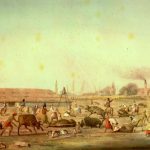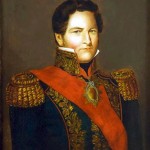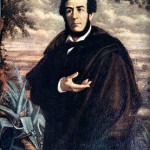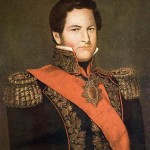 Nineteenth-century Latin America was often a violent place, not unlike what the English philosopher Thomas Hobbes describes as a “warre [. . .] of every man against every man.” To be fair, matters weren’t much better in Europe. But in general, the nineteenth century in Europe and North America saw the gradual acceptance of liberal doctrines and Enlightenment principles–at “home,” if not in the colonies abroad. By contrast, in Latin America liberalism has never really flourished.
Nineteenth-century Latin America was often a violent place, not unlike what the English philosopher Thomas Hobbes describes as a “warre [. . .] of every man against every man.” To be fair, matters weren’t much better in Europe. But in general, the nineteenth century in Europe and North America saw the gradual acceptance of liberal doctrines and Enlightenment principles–at “home,” if not in the colonies abroad. By contrast, in Latin America liberalism has never really flourished.
5. Caudillos Versus the Nation State
The nineteenth century in Europe and North America saw the gradual acceptance of liberal doctrines and Enlightenment principles. By contrast, in Latin America liberalism has never really flourished.
You should also watch the interview video with Rita De Grandis. Then there are the podcasts for this week, as well as student-made videos.
- Alexander Dawson, “Caudillos Versus the Nation State”. Latin America Since Independence: A History with Primary Sources. 2nd Edition. New York: Routledge, 2014. 45-71.
Note that each chapter of the textbook comes with online resources on the publisher's website. Simply click on the relevant tab for this week's reading.
Documents:
- Esteban Echeverría, "The Slaughterhouse" (1838/1871). (Dawson 59-71; Spanish original)
Caudillos and their Origins
Literature and Politics
This conversation with Rita De Grandis (French, Hispanic, and Italian Studies, UBC) discusses Argentine writer Esteban Echeverría’s story “The Slaughterhouse” (“El matadero”) in the context of the relationship between literature and politics in in Latin America.
Caudillos II
Madeleine Deis, Christine Joy Ganase, Frances Perry, and Stephanie Steevie:
Caudillos
Anna Wilmann, Elyse Doyle, Emma Elsner, Isabel Masters, Rachel White:
Caudillos versus the Nation State II
Haroun Khalid and Samy Megalli:
“Caudillos Versus the Nation State”
Caudillo
Alec Dawson (Professor, History and International Studies, Simon Fraser University), author of Latin America Since Independence: A History with Primary Sources, considers the ways in which the colonial history of the region impacted the process of creating modern states in Latin America.
This podcast complements chapter two of his textbook.
The Slaughterhouse
Jon Beasley-Murray (Hispanic Studies, University of British Columbia) and Alec Dawson (Professor, History and International Studies, Simon Fraser University) discuss Esteban Echeverría’s “The Slaughterhouse” and the tradition of the caudillo in Latin America.
This podcast is designed to complement chapter two of Alex Dawson’s textbook, Latin America Since Independence: A History with Primary Sources.
- Simón Bolívar
- Juan Manuel de Rosas
- Antonio López de Santa Anna
- Hugo Chávez
- Catherine Davies, Claire Brewster, and Hilary Owen, "Competing Masculinities and Political Discourse: The Writings of Esteban Echeverría (1805–51)." In Catherine Davies, Claire Brewster, and Hilary Owen (eds), South American Independence: Gender, Politics, Text. Liverpool: Liverpool University Press, 2006.
- Tomás Eloy Martínez, "Tombs of Unrest". Transition 80 (1999): 72-84.
- John Lynch, Argentine Caudillo: Juan Manuel de Rosas. Wilmington, DE: Scholarly Resources, 2001.
- Domingo Faustino Sarmiento, Facundo: Civilization and Barbarism. Trans. Kathleen Ross. Berkeley and Los Angeles: University of California Press, 2003.
- Roberto Schwarz, Misplaced Ideas: Essays on Brazilian Culture. London: Verso, 1992.
- After the optimism displayed by a writer such as Bolívar, why did central authority break down in post-independence Latin America?
- What are the advantages and attractions of liberalism?
- What are the advantages and attractions of caudillaje and clientelism?
- Why might some social groups rather than others prefer the caudillo system to liberal rights and freedoms?
- What can we learn about history from literature, or from a literary text such as Echeverría's?
- How does Echeverría try to direct our sympathies in "The Slaughterhouse"? Why does he choose to tell this tale in order to paint a picture of Argentina under Rosas?






